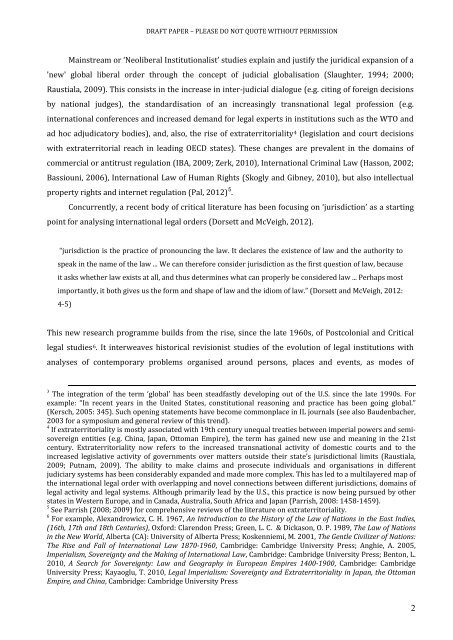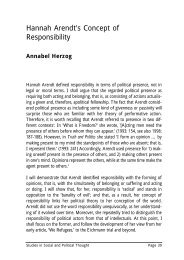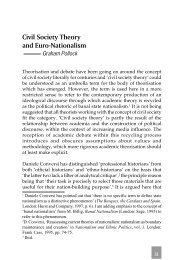Historical Materialism and International Law - University of Sussex
Historical Materialism and International Law - University of Sussex
Historical Materialism and International Law - University of Sussex
Create successful ePaper yourself
Turn your PDF publications into a flip-book with our unique Google optimized e-Paper software.
DRAFT PAPER – PLEASE DO NOT QUOTE WITHOUT PERMISSION<br />
Mainstream or ‘Neoliberal Institutionalist’ studies explain <strong>and</strong> justify the juridical expansion <strong>of</strong> a<br />
'new' global liberal order through the concept <strong>of</strong> judicial globalisation (Slaughter, 1994; 2000;<br />
Raustiala, 2009). This consists in the increase in inter-judicial dialogue (e.g. citing <strong>of</strong> foreign decisions<br />
by national judges), the st<strong>and</strong>ardisation <strong>of</strong> an increasingly transnational legal pr<strong>of</strong>ession (e.g.<br />
international conferences <strong>and</strong> increased dem<strong>and</strong> for legal experts in institutions such as the WTO <strong>and</strong><br />
ad hoc adjudicatory bodies), <strong>and</strong>, also, the rise <strong>of</strong> extraterritoriality 4 (legislation <strong>and</strong> court decisions<br />
with extraterritorial reach in leading OECD states). These changes are prevalent in the domains <strong>of</strong><br />
commercial or antitrust regulation (IBA, 2009; Zerk, 2010), <strong>International</strong> Criminal <strong>Law</strong> (Hasson, 2002;<br />
Bassiouni, 2006), <strong>International</strong> <strong>Law</strong> <strong>of</strong> Human Rights (Skogly <strong>and</strong> Gibney, 2010), but also intellectual<br />
property rights <strong>and</strong> internet regulation (Pal, 2012) 5 .<br />
Concurrently, a recent body <strong>of</strong> critical literature has been focusing on ‘jurisdiction’ as a starting<br />
point for analysing international legal orders (Dorsett <strong>and</strong> McVeigh, 2012).<br />
“jurisdiction is the practice <strong>of</strong> pronouncing the law. It declares the existence <strong>of</strong> law <strong>and</strong> the authority to<br />
speak in the name <strong>of</strong> the law ... We can therefore consider jurisdiction as the first question <strong>of</strong> law, because<br />
it asks whether law exists at all, <strong>and</strong> thus determines what can properly be considered law ... Perhaps most<br />
importantly, it both gives us the form <strong>and</strong> shape <strong>of</strong> law <strong>and</strong> the idiom <strong>of</strong> law.” (Dorsett <strong>and</strong> McVeigh, 2012:<br />
4-5)<br />
This new research programme builds from the rise, since the late 1960s, <strong>of</strong> Postcolonial <strong>and</strong> Critical<br />
legal studies 6 . It interweaves historical revisionist studies <strong>of</strong> the evolution <strong>of</strong> legal institutions with<br />
analyses <strong>of</strong> contemporary problems organised around persons, places <strong>and</strong> events, as modes <strong>of</strong><br />
3 The integration <strong>of</strong> the term ‘global’ has been steadfastly developing out <strong>of</strong> the U.S. since the late 1990s. For<br />
example: “In recent years in the United States, constitutional reasoning <strong>and</strong> practice has been going global.”<br />
(Kersch, 2005: 345). Such opening statements have become commonplace in IL journals (see also Baudenbacher,<br />
2003 for a symposium <strong>and</strong> general review <strong>of</strong> this trend).<br />
4 If extraterritoriality is mostly associated with 19th century unequal treaties between imperial powers <strong>and</strong> semisovereign<br />
entities (e.g. China, Japan, Ottoman Empire), the term has gained new use <strong>and</strong> meaning in the 21st<br />
century. Extraterritoriality now refers to the increased transnational activity <strong>of</strong> domestic courts <strong>and</strong> to the<br />
increased legislative activity <strong>of</strong> governments over matters outside their state’s jurisdictional limits (Raustiala,<br />
2009; Putnam, 2009). The ability to make claims <strong>and</strong> prosecute individuals <strong>and</strong> organisations in different<br />
judiciary systems has been considerably exp<strong>and</strong>ed <strong>and</strong> made more complex. This has led to a multilayered map <strong>of</strong><br />
the international legal order with overlapping <strong>and</strong> novel connections between different jurisdictions, domains <strong>of</strong><br />
legal activity <strong>and</strong> legal systems. Although primarily lead by the U.S., this practice is now being pursued by other<br />
states in Western Europe, <strong>and</strong> in Canada, Australia, South Africa <strong>and</strong> Japan (Parrish, 2008: 1458-1459).<br />
5 See Parrish (2008; 2009) for comprehensive reviews <strong>of</strong> the literature on extraterritoriality.<br />
6 For example, Alex<strong>and</strong>rowicz, C. H. 1967, An Introduction to the History <strong>of</strong> the <strong>Law</strong> <strong>of</strong> Nations in the East Indies,<br />
(16th, 17th <strong>and</strong> 18th Centuries), Oxford: Clarendon Press; Green, L. C. & Dickason, O. P. 1989, The <strong>Law</strong> <strong>of</strong> Nations<br />
in the New World, Alberta (CA): <strong>University</strong> <strong>of</strong> Alberta Press; Koskenniemi, M. 2001, The Gentle Civilizer <strong>of</strong> Nations:<br />
The Rise <strong>and</strong> Fall <strong>of</strong> <strong>International</strong> <strong>Law</strong> 1870-1960, Cambridge: Cambridge <strong>University</strong> Press; Anghie, A. 2005,<br />
Imperialism, Sovereignty <strong>and</strong> the Making <strong>of</strong> <strong>International</strong> <strong>Law</strong>, Cambridge: Cambridge <strong>University</strong> Press; Benton, L.<br />
2010, A Search for Sovereignty: <strong>Law</strong> <strong>and</strong> Geography in European Empires 1400-1900, Cambridge: Cambridge<br />
<strong>University</strong> Press; Kayaoglu, T. 2010, Legal Imperialism: Sovereignty <strong>and</strong> Extraterritoriality in Japan, the Ottoman<br />
Empire, <strong>and</strong> China, Cambridge: Cambridge <strong>University</strong> Press<br />
2
















